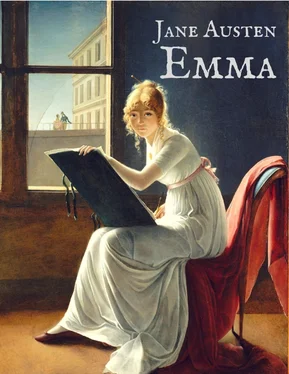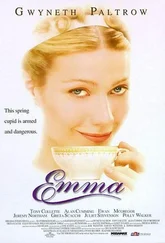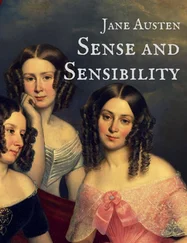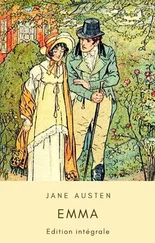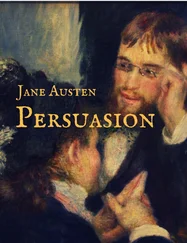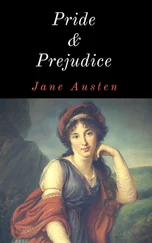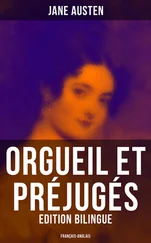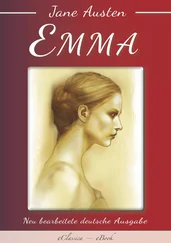Mrs. Goddard, and the teachers, and the girls and the affairs of the school in general, formed naturally a great part of the conversation—and but for her acquaintance with the Martins of Abbey-Mill Farm, it must have been the whole. But the Martins occupied her thoughts a good deal; she had spent two very happy months with them, and now loved to talk of the pleasures of her visit, and describe the many comforts and wonders of the place. Emma encouraged her talkativeness—amused by such a picture of another set of beings, and enjoying the youthful simplicity which could speak with so much exultation of Mrs. Martin's having “ two parlours, two very good parlours, indeed; one of them quite as large as Mrs. Goddard's drawing-room; and of her having an upper maid who had lived five-and-twenty years with her; and of their having eight cows, two of them Alderneys, and one a little Welch cow, a very pretty little Welch cow indeed; and of Mrs. Martin's saying as she was so fond of it, it should be called her cow; and of their having a very handsome summer-house in their garden, where some day next year they were all to drink tea:—a very handsome summer-house, large enough to hold a dozen people.”
For some time she was amused, without thinking beyond the immediate cause; but as she came to understand the family better, other feelings arose. She had taken up a wrong idea, fancying it was a mother and daughter, a son and son's wife, who all lived together; but when it appeared that the Mr. Martin, who bore a part in the narrative, and was always mentioned with approbation for his great good-nature in doing something or other, was a single man; that there was no young Mrs. Martin, no wife in the case; she did suspect danger to her poor little friend from all this hospitality and kindness, and that, if she were not taken care of, she might be required to sink herself forever.
With this inspiriting notion, her questions increased in number and meaning; and she particularly led Harriet to talk more of Mr. Martin, and there was evidently no dislike to it. Harriet was very ready to speak of the share he had had in their moonlight walks and merry evening games; and dwelt a good deal upon his being so very good-humoured and obliging. He had gone three miles round one day in order to bring her some walnuts, because she had said how fond she was of them, and in every thing else he was so very obliging. He had his shepherd's son into the parlour one night on purpose to sing to her. She was very fond of singing. He could sing a little himself. She believed he was very clever, and understood every thing. He had a very fine flock, and, while she was with them, he had been bid more for his wool than any body in the country. She believed every body spoke well of him. His mother and sisters were very fond of him. Mrs. Martin had told her one day (and there was a blush as she said it,) that it was impossible for any body to be a better son, and therefore she was sure, whenever he married, he would make a good husband. Not that she wanted him to marry. She was in no hurry at all.
“Well done, Mrs. Martin!” thought Emma. “You know what you are about.”
“And when she had come away, Mrs. Martin was so very kind as to send Mrs. Goddard a beautiful goose—the finest goose Mrs. Goddard had ever seen. Mrs. Goddard had dressed it on a Sunday, and asked all the three teachers, Miss Nash, and Miss Prince, and Miss Richardson, to sup with her.”
“Mr. Martin, I suppose, is not a man of information beyond the line of his own business? He does not read?”
“Oh yes!—that is, no—I do not know—but I believe he has read a good deal—but not what you would think any thing of. He reads the Agricultural Reports, and some other books that lay in one of the window seats—but he reads all them to himself. But sometimes of an evening, before we went to cards, he would read something aloud out of the Elegant Extracts, very entertaining. And I know he has read the Vicar of Wakefield. He never read the Romance of the Forest, nor The Children of the Abbey. He had never heard of such books before I mentioned them, but he is determined to get them now as soon as ever he can.”
The next question was—
“What sort of looking man is Mr. Martin?”
“Oh! not handsome—not at all handsome. I thought him very plain at first, but I do not think him so plain now. One does not, you know, after a time. But did you never see him? He is in Highbury every now and then, and he is sure to ride through every week in his way to Kingston. He has passed you very often.”
“That may be, and I may have seen him fifty times, but without having any idea of his name. A young farmer, whether on horseback or on foot, is the very last sort of person to raise my curiosity. The yeomanry are precisely the order of people with whom I feel I can have nothing to do. A degree or two lower, and a creditable appearance might interest me; I might hope to be useful to their families in some way or other. But a farmer can need none of my help, and is, therefore, in one sense, as much above my notice as in every other he is below it.”
“To be sure. Oh yes! It is not likely you should ever have observed him; but he knows you very well indeed—I mean by sight.”
“I have no doubt of his being a very respectable young man. I know, indeed, that he is so, and, as such, wish him well. What do you imagine his age to be?”
“He was four-and-twenty the 8th of last June, and my birthday is the 23rd just a fortnight and a day's difference—which is very odd.”
“Only four-and-twenty. That is too young to settle. His mother is perfectly right not to be in a hurry. They seem very comfortable as they are, and if she were to take any pains to marry him, she would probably repent it. Six years hence, if he could meet with a good sort of young woman in the same rank as his own, with a little money, it might be very desirable.”
“Six years hence! Dear Miss Woodhouse, he would be thirty years old!”
“Well, and that is as early as most men can afford to marry, who are not born to an independence. Mr. Martin, I imagine, has his fortune entirely to make—cannot be at all beforehand with the world. Whatever money he might come into when his father died, whatever his share of the family property, it is, I dare say, all afloat, all employed in his stock, and so forth; and though, with diligence and good luck, he may be rich in time, it is next to impossible that he should have realised any thing yet.”
“To be sure, so it is. But they live very comfortably. They have no indoors man, else they do not want for any thing; and Mrs. Martin talks of taking a boy another year.”
“I wish you may not get into a scrape, Harriet, whenever he does marry;—I mean, as to being acquainted with his wife—for though his sisters, from a superior education, are not to be altogether objected to, it does not follow that he might marry any body at all fit for you to notice. The misfortune of your birth ought to make you particularly careful as to your associates. There can be no doubt of your being a gentleman's daughter, and you must support your claim to that station by every thing within your own power, or there will be plenty of people who would take pleasure in degrading you.”
“Yes, to be sure, I suppose there are. But while I visit at Hartfield, and you are so kind to me, Miss Woodhouse, I am not afraid of what any body can do.”
“You understand the force of influence pretty well, Harriet; but I would have you so firmly established in good society, as to be independent even of Hartfield and Miss Woodhouse. I want to see you permanently well connected, and to that end it will be advisable to have as few odd acquaintance as may be; and, therefore, I say that if you should still be in this country when Mr. Martin marries, I wish you may not be drawn in by your intimacy with the sisters, to be acquainted with the wife, who will probably be some mere farmer's daughter, without education.”
Читать дальше
